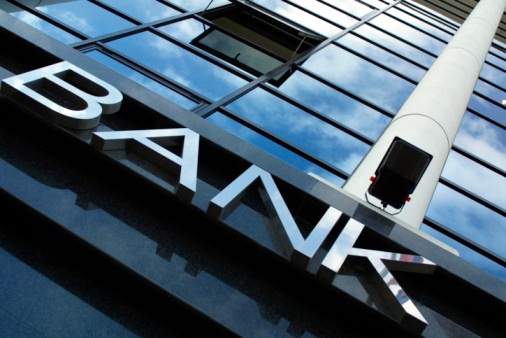Banking, finance, and taxes
Major Banks May Have More Risk Than Reward: Will Short Sellers Pounce?
Published:
Last Updated:
After the market implosion of 2007 and 2008, the major U.S. banks were all reeling from the same disease. The housing bust and the slew of horrible mortgage backed securities deals that were floated to finance the subprime market blew up in their faces. Bear Stearns was sold to J.P. Morgan for $10 a share, and Lehman Brothers, unable to find a buyer, declared bankruptcy. Merrill Lynch stared into the abyss and was rescued by Bank of America. The combination of leverage and incredible hubris pushed the banking system and the economy to the very brink.
Rescue to the fallen came from the U.S. government, and even from individuals like Warren Buffett, who almost single-handedly bailed out Goldman Sachs. The stocks traded into the single digits, and politicians in Washington expressed their outrage. The often used phrase “too big to fail” became synonymous with the period. Times were dark, and we were told that the country was on the brink of depression.
Slowly, but surely, the gloom lifted and things started to revert to normal. Contrary to what all the major media outlets trumpeted, the American dream of owning a home was revived and construction resumed after almost four years at a standstill. The major banks, which had cut their dividends, sold millions of shares to the public to finance the payback of their government bailouts. Earnings improved, the stock prices came back, Wall Street is in love with itself again. There may be a problem though, a number of problems.
Trading revenues are reported to be very weak. As interest rates have crept higher, mortgage refinancing is slowing, and most of the large banks have reported that they will lay off people in their mortgage divisions. Legal costs and settlements are continuing to rise as lawsuits current and related to the housing meltdown continue to weigh on the banks. We examined the big banks to see which stocks may be vulnerable as the third-quarter earnings parade is posed to start soon.
Bank of America Corp. (NYSE: BAC) is one of the banks that has scaled back mortgage refinancing operations significantly. While the acquisition of Merrill Lynch has been a tremendous boost to the top and bottom line, the company still faces litigation over mortgages and practices. They recently settled with the New York Attorney General over alleged compliance problems. The Thomson/First Call price target for the stock is $15.50. Investors are paid a small 0.3% dividend. Bank of America closed Wednesday at $14.06.
Citigroup Inc. (NYSE: C) may be one of the banks in the best situation. It is completing its sale of Smith Barney and has refocused on the international business as a way to spark earnings. Citigroup recently received approval for its Chinese unit to start building branches in Shanghai’s new free-trade zone, which will make Citigroup one of the first foreign banks able to target businesses there. The consensus price target for the stock is $60. Investors are paid a miniscule 0.8% dividend, which may be poised to rise. The stock closed Wednesday at $48.71.
Goldman Sachs Group Inc. (NYSE: GS) recently paid back Warren Buffett for the loans that helped it through the financial crisis. The total haul came to $2 billion, received from gains on warrants he obtained through a big bet during the 2008 financial crisis. While Goldman’s stock has done well, investment banking and trading revenues are expected to fall. It is very possible the stock is fully valued at current levels. The consensus price target for Goldman Sachs is $165. Investors are paid a 1.25% dividend. The stock closed Wednesday at $158.67.
J.P. Morgan Chase & Co. (NYSE: JPM) is staring down the barrel of an $11 billion dollar penalty and settlement. CEO and Chairman Jamie Dimon, in an almost unprecedented action, has met directly with Attorney General Eric Holder to discuss the mortgaged backed securities probe. This comes on the heels of an embarrassing and huge trading loss in its London office. J.P. Morgan may be another stock that is poised for a downturn. The consensus price target is listed at $64. Investors are paid a 2.93% dividend. The stock closed on Wednesday at $52.09.
Morgan Stanley (NYSE: MS) has seen its business improve dramatically in multiple areas, including investment banking and trading. The company is completing its purchase of Smith Barney, and the added salesforce is beginning to contribute to retail brokerage revenues. The bank also is not burdened with the mortgage mess that some of its competitors are. The consensus price target for the stock is $30. Investors are paid a 0.73% dividend. Morgan Stanley closed Wednesday at $27.12.
Wells Fargo & Co. (NYSE: WFC) is saddled with the issue of too many people in its mortgage refinancing area. While it has become the go-to lender, it is facing big layoffs as refinancing slows. The New York State Attorney General is suing the bank for violating the 2012 National Mortgage Settlement. This also may be a company to sell and move to another stock. The consensus price target for the stock is $46. Investors are paid a 2.92% dividend. The stock closed Wednesday at $41.26.
Many equity strategists lump the financials in with tech and energy as sectors to own in 2014. Financials are needed to be market leaders for the indexes to make new highs. While the long-term prospects for the big Wall Street banks remains good, the short-term third-quarter issues may be disappointing. Investors with big gains may want to sell at least half of their positions and see if the stocks do not trade down following warnings and earnings. Like the old saying goes, “nobody ever went broke taking a profit.”
Thank you for reading! Have some feedback for us?
Contact the 24/7 Wall St. editorial team.